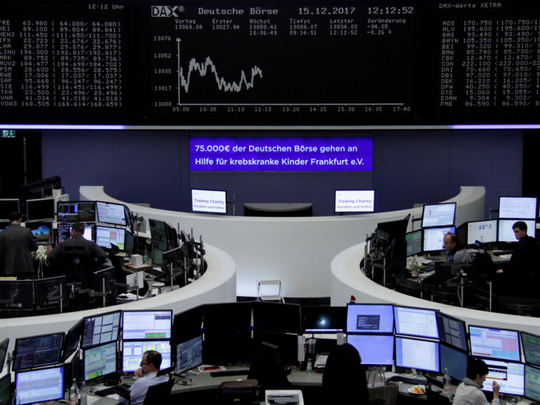
LONDON: World shares fell on Friday and the dollar slipped against major and heavyweight emerging market currencies, as nagging uncertainty about a US tax cuts package dovetailed with broad-based end-of-year caution.
It was a groggy end to what was still set to be a third week of gains for MSCI’s global stock index following more upbeat data and signs that central banks including the Federal Reserve have no plans to really jack up interest rates.
Japan’s Nikkei weakened overnight and Europe was firmly in the red, as a 15 per cent slump in fashion giant H & M and near 9 per cent drop Italian luxury goods firm Ferragamo spooked retailers.
Banks struggled too on a renewed dip in Eurozone bond yields after Thursday’s message from the European Central Bank that it was sticking to its pledge to keep money pouring into the bloc’s economy for as long as needed.
“The theme is still one of gradual policy tightening,” said Societe Generale interest rates strategist Jason Simpson, who said the Bank of England had also sent a steady-as-you-go signal at its meeting the previous day.
“Today is also going to be the last one (this year) of any real flow ... so bond yields are just squeezing lower as any short positions are being covered.” In the currency markets, the dollar was down at 112.19 against the yen and, despite having been at a one-month high earlier in the week, stuttering towards a 0.3 per cent weekly drop against a basket of six rival currencies.
Ongoing wrangling in the US Congress over a bill to cut taxes on Thursday dented confidence that the reforms would be pushed through in their current state. Two more Republican senators insisted on changes.
Florida’s Marco Rubio, a former presidential contender, told reporters on Capitol Hill that if the bill’s proposed refundability to taxpayers of the child tax credit was not expanded, “I’m a no”.
“The more the tax bill gets watered down, the less pronounced the effect will be on the dollar.” said Commerzbank currency strategist Esther Reichelt, in Frankfurt.
The New Zealand dollar was the biggest mover among major currencies, up 0.6 per cent at a two-month high of $0.7029 after the country’s Finance Minister Grant Robertson said he was comfortable with the currency’s general trend.
That paled in significance compared with Bitcoin, though, as the digital currency blasted to another all-time high of almost $18,000, up 9 per cent on the day and now more than 1,700 per cent this year.
Bitcoin has soared almost 80 per cent so far in December alone, putting it on track for its best month in percentage terms since December 2013, though worries remain.
A study by Anglia Ruskin University, Trinity College Dublin and Dublin City University released on Friday said bitcoin could pose a threat to the financial stability of traditional currencies and markets.
“Our evidence finds that the price of Bitcoin has been artificially inflated by speculative investment, putting it in a bubble,” Larisa Yarovaya, one of the report’s authors, said.
Tokyo toil
MSCI’s broadest index of Asia-Pacific shares outside Japan dipped 0.4 per cent overnight, but clung on for a 0.8 per cent gain for the week.
Japan’s Nikkei stock index finished 0.6 per cent down at its lowest in more than a week, with mobile firms extending a sell-off on concerns of increased competition after e-commerce group Rakuten said it aims to become the country’s fourth wireless carrier. The index was down 1.1 per cent for the week.
That was despite big Japanese manufacturers’ business confidence improving for a fifth straight quarter to hit an 11-year high according to the Bank of Japan’s closely-followed tankan survey showed.
Chinese shares had also drooped, with the Shanghai Composite Index off 0.8 per cent and the blue-chip CSI300 index finished down 1.1 per cent.
“The Nikkei came off its lows in the afternoon, largely on futures-led buying,” said Ayako Sera, senior market economist at Sumitomo Mitsui Trust. “But regional sentiment is still fragile, which will limit its upside.” In commodity markets, crude oil futures extended the previous day’s gains as a pipeline outage in Britain continued to support prices despite forecasts showing a global crude surplus in the beginning of next year.
US crude added 0.3 per cent, or 15 cents, to $57.19 a barrel, after gaining 0.8 per cent overnight. Brent crude futures were barely budged at $63.45.
Industrial metal copper, headed for a 3 per cent weekly gain after two weeks of hefty falls, while gold edged away from a four-month low hit earlier in week as it nudged up to $1,257 an ounce.












